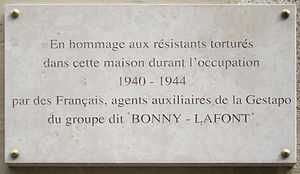Carlingue

The Carlingue (or French Gestapo ) were French auxiliaries who worked for the Gestapo during the occupation of France during the Second World War. The group, which was based at 93, rue Lauriston in the 16th arrondissement of Paris, was active between 1941 and 1944. It was jointly led by Henri Lafont and Pierre Loutrel, two criminals active in the French Underworld before the war. The group was also known as the Bonny-Lafont gang, named for another member, Pierre Bonny, an ex-cop with a shady past.
History
The group was formed in 1941 by the RSHA for counter insurgency work against the Maquis in occupied France and the Vichy Regime. The Germans referred to the Carlingue as Active Group Hesse, after the SS officer "who'd looked after its foundation".[1] The group recruited its members from the same criminal milieu as that of its leaders. Both Henri Lafont and Pierre Loutrel (alias Pierrot le fou (Crazy Pete)) were gangsters in the Parisian underworld before the war. Another member, an ex-cop named Pierre Bonny, had been wanted by the police for misappropriation of funds and selling influence in the Seznec and Stavisky affairs. Many others in the Carlingue were with the now-disbanded North African Brigades. The criminal nature of the organisation gave it access to contacts such as informers, corrupt officials, and disreputable business leaders such as Joseph Joanovici. Members were said to be active in the black market.
According to retired policeman Henri Longuechaud, "one might be scandalised by the numbers of 30,000 to 32,000 sometimes quoted [as members of the Carlingue]. In Paris, when the Germans launched a recruitment drive for 2,000 auxiliary policeman in their service, they received no fewer than 6,000 candidates."[2]
Principal members of the Carlingue were tried and condemned after the Liberation in 1944.
Legacy
- Paris installed a memorial plaque on 93, rue Lauriston to commemorate the victims of the Bonny-LaFont gang. In August 2014, the city ordered current owners to restore the memorial plaque to the building.[3]
Representation in other media
- Louis Malle's 1974 film, Lacombe Lucien, features characters based on the Bonny-LaFont gang.[4]
- In 2004, a made-for-television film was produced about the Carlingue, entitled 93, rue Lauriston. Although fictional, it was inspired by historic events and featured Lafont and Bonny as figures of the time.
- Patrick Modiano, French winner of the 2014 Nobel Prize for literature, has written several novels set in occupied Paris during the war years, mysteries of memory and alienation related to his exploration of his own father's activities as a black marketeer.[5][6]
See also
- Geheime Feldpolizei - the secret military police of the Wehrmacht in France.
- Special Brigades - a unit from the French police that specialized in fighting the French Resistance.
- Milice - a paramilitary force raised by Vichy France.
References
- ↑ King, David (2011). The City of Death. Crown. p. 142.
- ↑ Henri Longuechaud, Conformément à l’ordre de nos chefs, page 58, cited by Maurice Rajsfus in La Police de Vichy. Les forces de l'ordre françaises au service de la Gestapo. 1940/1944, Le Cherche Midi éditeur, 1995 (page 51).
- ↑ "Paris WW2 plaque to be restored on 'house of shame'". BBC News. 3 September 2014.
- ↑ Interview of historian Pierre Laborie in the French DVD's extras, Arte Video.
- ↑ [Alan Riding, "In Search of the Irrevocable"], New York Times, December 2014
- ↑ Schwartz, Alexandra (9 October 2014). "Patrick Modiano's Postwar World". The New Yorker. Retrieved 9 October 2014.